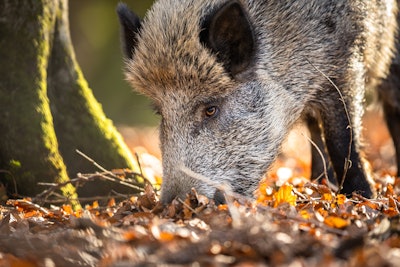
North Rhine-Westphalia has become the sixth state in Germany to have a confirmed case of African swine fever ASF.
The positive test — confirmed by the national veterinary agency, the Friedrich-Loeffler Institute (FLI) in the past two days – was obtained from a wild boar found dead in Olpe. This district is in the southeast of the state, not far from the borders with Hesse and Rhineland-Palatinate, where multiple cases in wild boar have been reported during the past year.
Further suspected cases found by trained dogs near to the infected carcass in North Rhine-Westphalia are under investigation by the FLI. The agency is also working to identify the virus, in order to ascertain any links to ongoing ASF outbreaks in other German states — Baden-Wurttemberg, Brandenburg, Hesse, Rhineland-Palatinate and Saxony.
Authorities in North Rhine-Westphalia have introduced a series of disease control measures, including the use of drones to seek out further infected carcasses or wild boar.
Following this latest development, FLI is warning pig farmers and hobby owners to review their biosecurity processes, including the use of clean, disinfected footwear and dedicated clothing before contact with swine. Further advice includes securing pig houses and feed stores to prevent entry by wild boar.
The summer months have been the peak season for ASF outbreaks in Germany’s domestic pigs in previous years. Since 2020, 19 of the nation’s herds have been infected by ASF.
ASF situation in Europe’s wild boar populations
To date, 17 countries in this region had logged a total of 6,629 outbreaks of ASF in their respective wild boar populations. This is according to the Animal Disease Information System from the European Commission (EC; as of June 11). The system monitors listed animal diseases in EU member states and selected adjacent countries.
During the whole of 2024, 21 of the region’s states registered a total of 7,892 ASF outbreaks in this category with the system.
The latest outbreak total represents an increase of 123 from the update one week previously.
Over that period, Poland, Germany and Hungary confirmed the most new cases, at 42, 35 and 17, respectively. There were also further — but far fewer — new outbreaks in Estonia, Italy, Latvia, Lithuania, Moldova, Romania and Slovakia.
Poland’s outbreak total in wild boar is also highest in the region for the year to date at 2,289, based on the EC system. Next come Germany (1,538), Latvia (623) and Hungary (563).
Romania reports new outbreaks in domestic swine
To date in 2025, 10 countries have registered a total of 240 ASF outbreaks in this population with the EC system (as of June 11).
For comparison, 764 outbreaks on farms and in backyard herds across 16 states were logged with the database.
Over the previous week, the total had increased by two — both in Romania.
So far in 2025, the highest number of outbreaks has been reported by Romania at 159, followed by Moldova (34).
Insight into the latest ASF outbreaks is given in official reports by national veterinary authorities to the World Organisation for Animal Health (WOAH).
Romania is the only country in Europe to have submitted such as report during the past seven days. It refers to a single outbreak in the southeast of the country, affecting one pig.
ASF developments in Africa
Over the past week, WOAH has been notified of two further outbreaks in South Africa. Both started in the second half of April.
Involved were a total of 182 domestic pigs in two village herds in the province of Gauteng.
These bring to 216 the total number of outbreaks in this area outside the nation’s ASF control zone since 2019, with more than 76,500 swine have been directly impacted in this ASF outbreak series.
During the second half of 2024, outbreaks of the disease in domestic pigs were recorded in Uganda and the Democratic Republic of Congo. This is according to recently validated six-monthly reports to WOAH.
ASF alerts raised in Southeast Asia
To date in 2025, 251 outbreaks of ASF have been confirmed across 35 provinces/cities of Vietnam.
According to DanViet citing official figures, these represent a 62% reduction in the number of outbreaks and 15% fewer affected communities compared with the same period of 2024.
However, BaoPhuTho reports authorities warning that ASF is on the rise nationwide. It adds that losses of pigs through mortality or culling stands at 10,156 for the year so far, and that cases have been confirmed within the past 21 days in 17 provinces.
Reflecting the seriousness of the disease situation, provincial authorities have called on local communities to implement targeting measures to bring ASF under control.
This includes Thanh Hoa province in the North Central Coast region, reports BaoThanhHoa, and Lang Son in the North East, according to NhaChanNuoi.
In the Philippines, a three-day ASF awareness campaign is taking place in Surigao Sur, reports the official Philippine News Agency.
Located in the Caraga region on the island of Mindanao, this province is one of 20 in the region where ASF has been controlled. While the process toward eradication is underway, controlled movements of pigs and pork products are permitted.
Meanwhile, the ASF situation is active in five regions of the country, according to Department of Agriculture’s Bureau of Animal Industry (as of June 6).
These regions are identified as Cordillera Administrative Region, Central Luzon and Bicol on the island of Luzon, as well as Central Visayas and Eastern Visayas. Worst affected province in terms of the number of affected communities continues to be Bohol in the Central Visayas island region.
Disease developments in South Asia
With the aim to bring the ASF situation under control, the authorities in the northeast Indian state of Assam are placing further restrictions on the transportation of live pigs.
Among the latest restrictions brought in by the government of Assam is a requirement for all live pigs being transported into or within the state to be accompanied by a health certificate, reports India Today NE. This documentation must declare the animals to be free from ASF within the previous seven days, and be obtained from a registered laboratory. Bills to prove the source and destination of the animals are also required.
As well as checking documentation at key checkpoints in the state, officials will inspect swine for any signs of disease, and carry out rapid disease tests on a sample of at least 2% of the animals aboard. Positive results will result in all the animals being culled without compensation.
Also included in Assam’s new Standard Operation Procedure are bans on nighttime animal movements, unscheduled unloading, train stops involving swine and the removal of animal wastes within the state.
Furthermore, vehicles carrying pigs will have to be cleaned and sanitized before and after entering the state. Penalties for non-compliance include blacklisting and legal proceedings.
Meanwhile, the government of Nepal has formed a task force to study the spread of ASF in the country.
According to My Republica, the team will investigate the disease situation in various regions, and develop plans to bring the disease under control.
A recent U.S. study reveals that the ASF virus can be transmitted by ticks.
View our continuing coverage of the global African swine fever situation.

















